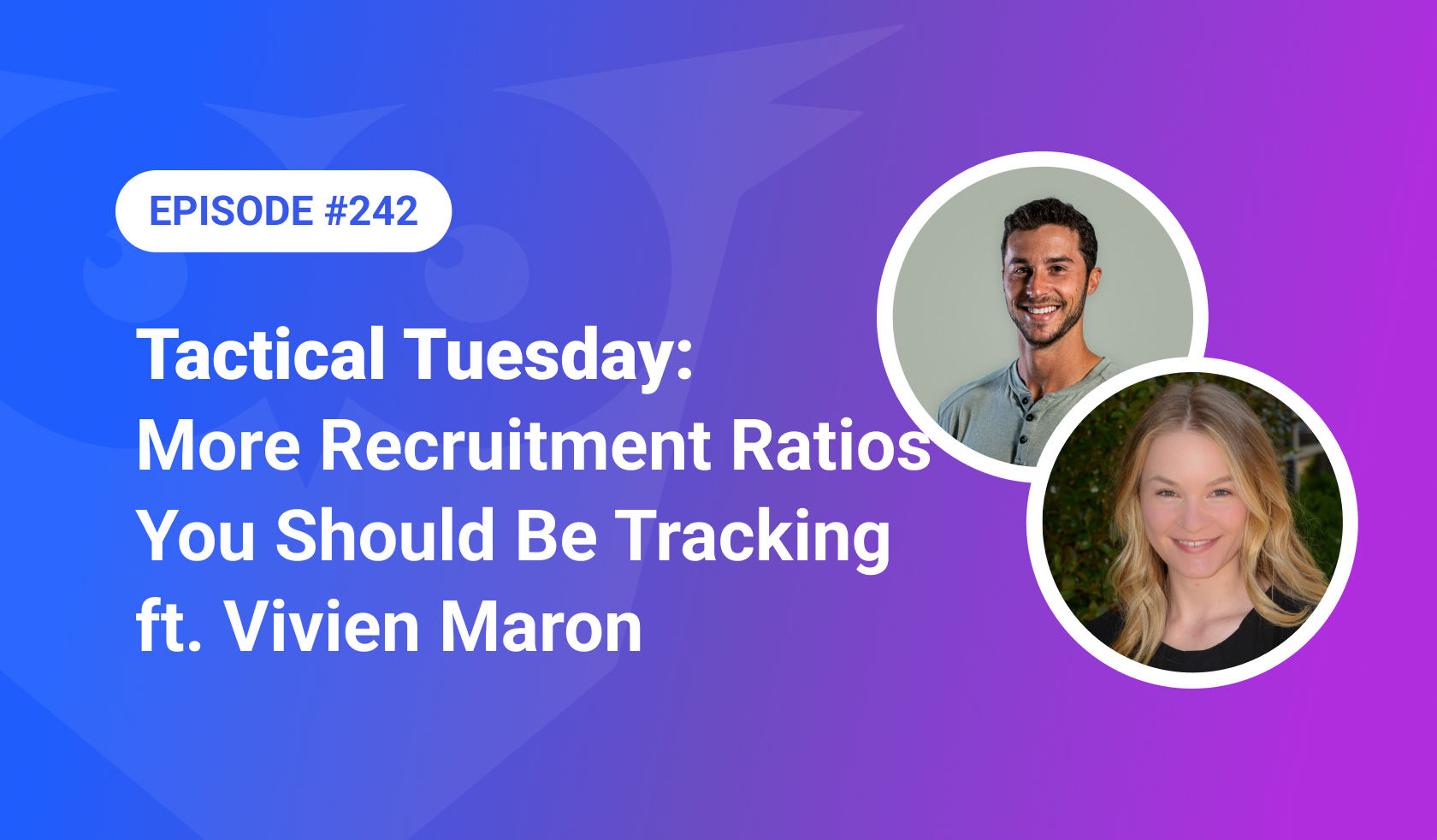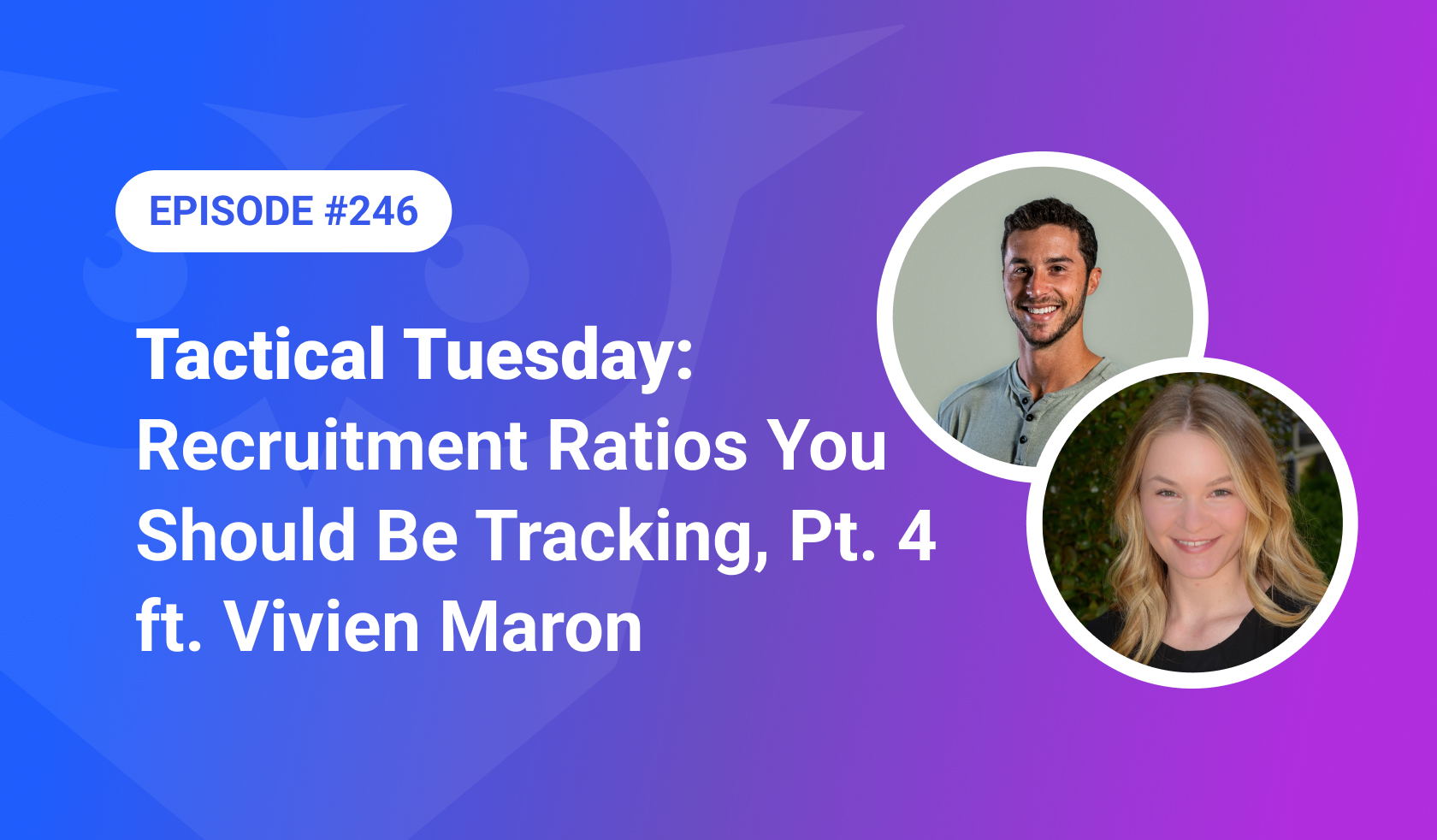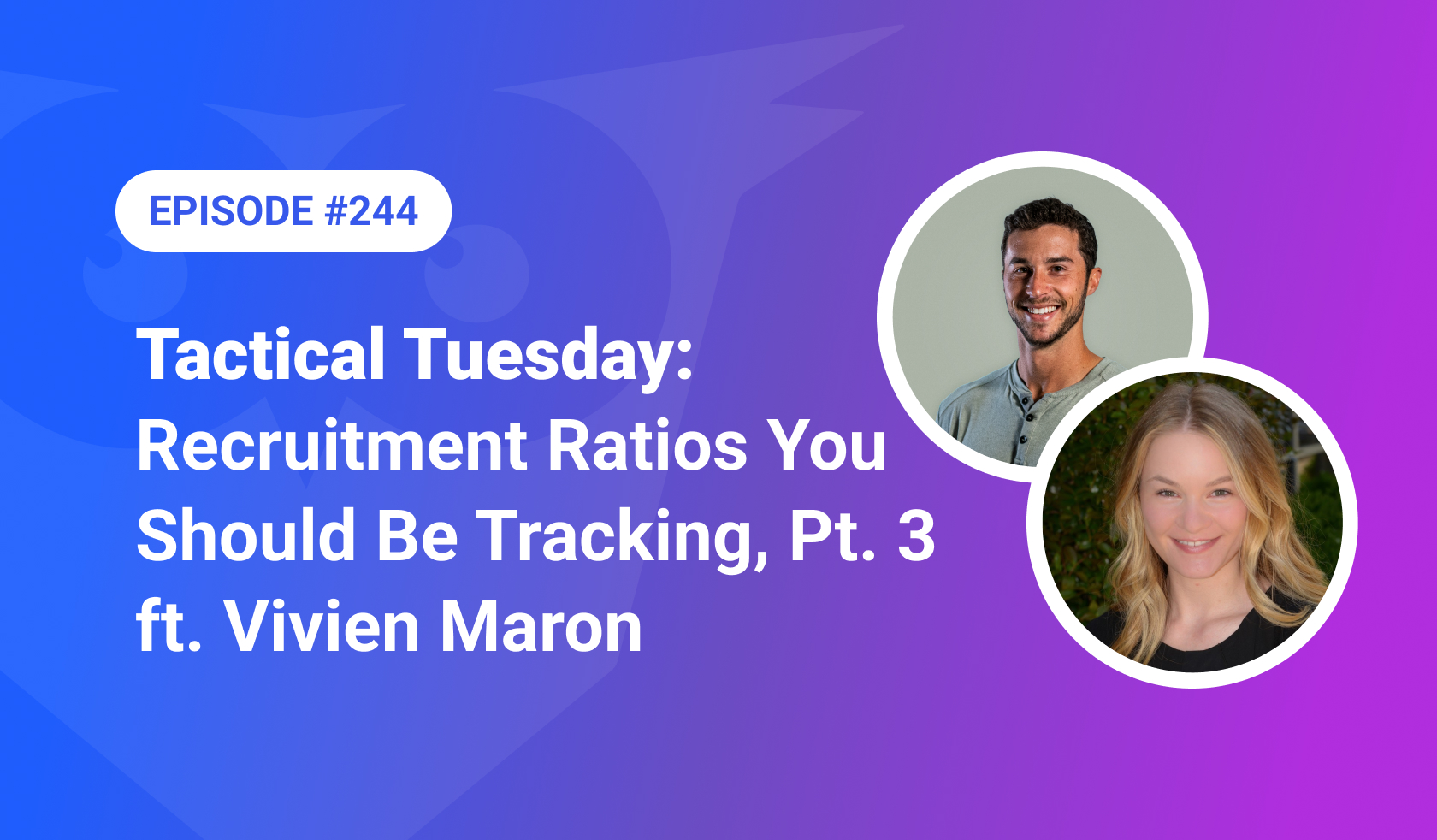In this Tactical Tuesday episode, Sam and Vivien discuss the importance of proactive business development in recruitment, focusing on Loxo's Account-Based Prospecting and how to effectively leverage Most Placeable Candidates (MPCs).
Throughout the conversation, they explore strategies for identifying suitable companies for candidates — and emphasize the significance of tailored outreach to enhance engagement and build relationships.
Are you currently doing any proactive bizdev? If not, this episode will give you a great overview of the basics and a good idea of where to start!
Transcript
Sam (00:00.91)
Hey everyone, it's Sam Keenly and welcome back to Becoming a Hiring Machine. This is the show dedicated to fixing recruitment by going beyond saying what needs to change and instead teaches you how to make a change. Today, we've got a great Tactical Tuesday episode ahead of us, but before we get into that, I want to tell you a little bit about the show. Essentially, we have shows within the show here. Some days we have interviews with industry thought leaders and others who are shaking up the space, while other days we cover trending topics.
Stop by every Tuesday, like today for Tactical Tuesday episode, where we go deep on how to do something that's going to help you draw better results in your day to day. And occasionally you get a mic drop episode from Matt, where he shares something that he's been thinking about within the recruitment space and wants you to know. As a reminder, if like the content that we share here on the show, make sure that you subscribe for more. All right, today's Tactical Tuesday. As a recruiter, you have to do business development. It can be kind of a daunting task though. Like where do we get started and figure out who we should reach out to? It's a very easy question to ask, but...
once you start to think about it, it's almost, you know, a difficult one to figure out like what path should I take? So what we found is that most successful agencies have a niche that they focus on, whether it be a specific industry, a job function, company size or type, so on and so forth. But just this past week, we launched a brand new product, account-based prospecting. And this product, while without tooting our own horn too much, is the first recruitment software platform that has purpose-built this type of
business growth engine into it. So with all the goodness that's going to come with unpacking this, we're going to have a two-part series that covers MPC, or sorry, that covers account-based prospecting. And today we're going to cover that from the MPC angle, which many of you are familiar with to help you understand how you can take advantage of this. So here to chat through this is your favorite Tactical Tuesday co-host, Vivian. Vivian, welcome.
Vivien (01:47.504)
Hello, hello, you gave it all away just in the intro.
Sam (01:49.376)
I gave it all away. Yeah. It's a teaser. You call it maybe like a subconscious unconscious. I don't even know what kind of teaser it is, but I definitely leaked that one through. So I'm not going to steal your thunder. That's talk account based prospecting. And today we're going to do it from the angle of MPCs. What so many recruiters are already using when they think about biz dev.
Vivien (02:09.379)
Yeah, for sure. And so there's actually like two mini parts to this for today. Next week, we're going to talk about like a different angle of how to use this. So for those of you that are on video, I'm going to share my screen. I'm going to kind of walk you through exactly what I'm doing and how you can actually use this tool, which is really cool. So the two approaches are you have an MPC, you're actively trying to get into a new niche, a new kind of like area or focus, or you're a brand new recruiter.
Sam (02:18.157)
Mm-hmm.
Vivien (02:37.827)
So you have a couple of MPCs, most placeable candidates that are absolute standout candidates. want to pitch them to hiring managers, but now finding the type of company to pitch them to, that's a whole different story. And so this is where our brand new account based prospecting tool is going to be incredibly helpful. So let's say we have a candidate who wants to work for a company that is in generative AI, it's an up and coming industry. And then you have a couple of different filters. You can do it based on funding round, how long...
how long they have been in business, what's their estimated revenue, what's their growth stage, how many employees do they have, things like that. So if you have somebody that is very much like boots on the ground, I want to be in on the early stages, then you can add the generative AI industry and sector filter and filter by early stage. And this will give you all of the companies. have 148 that are in generative AI that are in the very early stages. And when you click on each of them,
This is where you actually get to see a couple of key people that you can then contact, reach out to, to basically pitch the candidate that you have. This is such a quick and easy way to look for people right in your database. You don't have to go to a million different tools. You just are right here. You're setting the filter and that's it. And that's how you pitch to pitch your MPC.
Sam (03:58.698)
Yeah. And so in this example, you said 148 companies. Some people think you might be like only 148 companies. It's like, no, only 148 companies. That's actually good that it is a small number because the outreach, the messaging that you use for this needs to be relevant to the hiring manager. your, is your pitching this? Like, yes, you could go very broad and say any generative AI company globally at any stage, but then you're, you're doing the old volume based play that we know it's, it's going to fall in deaf ears. It's not going to be relevant. It's not going to be tailored. If you're doing a proper MPC.
You really want to pitch this person and match it to the exact company. Like why there'll be such a strong fit. All of the beauty and the success that's going to come from that comes from the relevance and you being able to connect the dots and get that detail in it at a one-to-one level.
Vivien (04:41.243)
1000 % and we talked about this on the episode with Will Spengler from Frederick Fox about all things email deliverability. The days of just throw spaghetti at the wall and see what sticks business development wise using emails. It's just not working anymore. It's not going to lane do anywhere. So you're actually hurting yourself. You're literally hurting your deliverability. You're hurting your potential reputation because then if they ever look you up and really have I ever like this name sounds familiar. I was bugged by them. They don't know they don't recall it.
Sam (04:58.816)
Mm-hmm.
Vivien (05:09.999)
You bugged them about something and they didn't feel great about you or receiving the type of email that you send. But if they look you up, then it's like, ew, this person, you don't want that reaction. And so what are the best ways to do business development that worked really well for me is to really take the time to figure out what exactly does speak to generative AI is specific, but still very broad. can do so many different things within generative AI. It can be applied to food. can be applied to literally health chemistry.
Sam (05:20.205)
Mm-mm.
Vivien (05:38.894)
It can be within Loxo. There are so many different applications. So even within that, it makes sense to research the company, see where are they at, what have they posted and spend that time because you're going to get more than likely a response back from the 10 that you really do research, then the 148 that you just send a very generic outreach to because you have to make it sound like it's in their best interest to talk to you and the way to actually get that across.
is to say, I see you're at this particular stage. This candidate has experience getting companies from this stage to the next or something very specific that basically like hits a button. It touches a wound. It pokes something in them where they feel that pain, but in a good way, kind of like when you are stretching. I know not everybody likes stretching, but when you stretch, there's that like good pain. This is so, okay, we're going with this.
You want them to feel the good pain that they action in, not the like bad pain where they're like, get away from me, block, spam, never talk to you again. So that's kind of what you want to do because this is where you as a recruiter, you come in as a service, you help them solve a problem that is painful to them that they have not been able to solve. And when you come in and swoop in as an expert, you've done your research, you're going to get some kind of engagement. And even if it doesn't work out, you have a positive reputation already. You've built a relationship.
Next summer round it's not going to be cold outreach anymore. It's going to be warm and eventually you're going to get them warm and fuzzy and they'll sign an agreement with you and make placements and pay you boatloads of money. Scrooge by textile.
Sam (07:10.435)
Mm-hmm.
Sam (07:18.766)
Oh yeah, swimming in it. I love it. Okay, so that's one, almost like the, not one on one level, but like the bass one, I see you think about just traditional MPC and how to leverage it. You said we've got two today. What's the second one?
Vivien (07:33.478)
The second one is any time that you do a search, there's probably more than one candidate that has interviewed that was a good fit, but just wasn't the best person for the job, but still absolutely great. Don't waste them. They're great candidates. As they're going through the interviews, start research, especially if they get to the second round, because first round, this is where still the bad apples can kind of like fall off. But when they get to the second round,
They were good. They passed the initial check. There was initial interest, and then it comes down to the details. And so what you want to do is when you start noticing candidates are going into the second stage, start doing research on similar companies. So if you have your company, then let me just go into, let's go with this one.
Vivien (08:22.465)
example. Let's see, let's go with this one for example.
Also no other companies. We might want to cut this one out. All right, awesome. We're just going to ignore this one. So in Loxo, we have like a similar companies feature. And this is where essentially if you have your hiring company, they're in the second round. What you want to do is you want to check out what are some similar companies where I can reach out and pitch these particular candidates and say, hey, I have really great candidates. They're actively looking. This is the impact that they have made. And the cool thing is you already have an edge because
Sam (08:35.448)
I'll
Vivien (09:00.821)
you have a relationship with the hiring manager of that one particular company. They've told you exactly what problems they have. They told you exactly what problems they're hoping for this candidate to solve. You can literally take that and pitch this to some other very similar companies to the one that you're working with right now to give the candidates that are not going to get hired, but that made it to the second plus interview and give them a new home.
Sam (09:25.848)
Hmm. Especially through those conversations early on, usually like to also ask candidates, like, what are you looking for specifically your next role? Like where have you thrived? Do you like working for nonprofits for profits? Do you like to do something that's in certain industry or related to this? As you take those notes, you can also layer that on top of the, the accounts that you want to reach out to and use that to inform the filters to hone in even more. like, there's so much good data that you're harvesting. Finding great candidates is the hardest part. Once you found them.
Like, use that to your advantage.
Vivien (09:58.224)
And they're already looking. So it's not like you have to convince them. You can actually be a really great recruiter and be like, Hey, I'm sorry that this didn't work out, but I actually just heard back from this company, which is very similar. They're looking for someone exactly like you. Are you interested in potentially interviewing? And that way it's not like a one and done type thing, but you're actually building relationships in a network where you can recycle because now where email deliverability is such a big thing.
Sam (10:15.149)
Mm-hmm.
Sam (10:19.48)
Yeah.
Vivien (10:23.149)
everybody's jumping around and it's really hard to get somebody's attention, whether it's a hiring manager or even a candidate. If you can recycle, that's really awesome. It's good for you. It requires less effort on your part and you have relationships. And that's a really good one because even if you don't end up placing this candidate, but you worked on getting them into three different in front of three different companies, they're going to remember you and they're going to be like, this person is really, really thorough. And if they ever need a recruiter,
You're going to be the first one that comes to mind. And if they ever have someone that is actively looking for a job within your niche, they're going to send candidates over your way for referrals and be like, I worked with this recruiter, really awesome recruiter. It didn't work out, but they are really thorough. If you need a recruiter, go to this one.
Sam (11:05.838)
Yeah, it's such a good point. So I'm excited to see all that is to come with this new product, account-based prospecting. Lex and I are gonna go deep into it in an episode that shortly follows this one, and then we're gonna have a part two, and I'm sure we're gonna keep talking more and more about it. Eventually, I'll some customers on that will share some success stories. But regardless of if you use Lockzoo, if you don't use Lockzoo, these are good business development.
general practices to follow as you're thinking about how do I track new business? How do I do outreach? How should I think about going after the market itself? So definitely recommend that you, you give these a listen. You let us know how it works for you and see what happens when you apply some of them. So Vivian, as always, appreciate you joining. Come share these, these nuggets of wisdom with us and getting into the weeds of it. So thank you as always. Okay. Well.
Vivien (11:54.583)
Of course.
Sam (11:56.864)
As we wrap, Becoming a Hiring Machine is a production of Loxo. If you like this episode, but you're not sure where to go next, we've got a link to a similar one. You can find that in the show notes within the description. Full video episodes are available on YouTube as well as on our website. So especially with the example of this episode, there is some video footage that you'll want to check out. If you ever have questions, similar way, podcast at loxo.co. And lastly, if you love this episode, please make sure to leave us a quick rating and your podcast streaming platform.
takes you three seconds, but it's going to help other recruiters like you to find us. So, all right, everyone, that's the show. That was another great Tactical Tuesday with Vivian. Until next time, bye y'all.
More from Becoming a Hiring Machine
Become a hiring machine
Ready to see for yourself how Loxo can transform your recruitment workflow and make you more efficient than ever before? We thought you might be.



